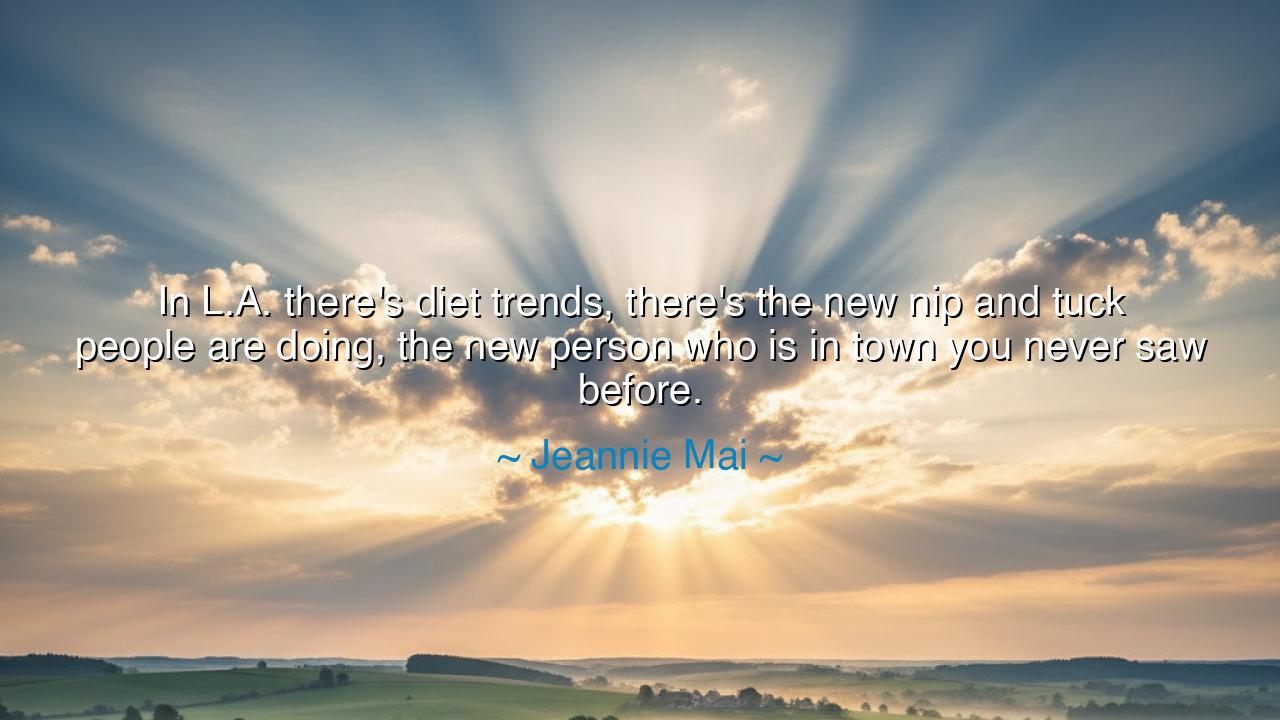
In L.A. there's diet trends, there's the new nip and tuck people
In L.A. there's diet trends, there's the new nip and tuck people are doing, the new person who is in town you never saw before.






The words of Jeannie Mai—“In L.A. there’s diet trends, there’s the new nip and tuck people are doing, the new person who is in town you never saw before”—speak not merely of a city, but of an era. Beneath the surface of casual observation lies a deeper reflection on the human hunger for reinvention, for the endless pursuit of perfection that drives so much of modern life. In her tone, there is no bitterness, only the weary amusement of one who has seen through illusion. Her words reveal the eternal dance between image and identity—the way people chase after the latest trends, sculpt their bodies, and transform their faces, all in the hope of belonging or shining more brightly under the city’s unrelenting light.
To understand her meaning, one must first understand Los Angeles—the city of dreams and mirages, of gold dust and glass. It is a place where beauty is both a currency and a creed, where fame is sought as fiercely as faith once was. The “diet trends” and “nip and tuck” that Jeannie Mai speaks of are not mere vanities; they are the rituals of a culture that worships youth and appearance. Every “new person in town” is a symbol of renewal, a reminder that in such a place, identity itself can be refashioned, repainted, or remade. Yet behind the glamour, there is restlessness—a yearning that even the most perfect form cannot satisfy.
The origin of this wisdom lies in Mai’s own journey through the world of media and beauty. As a television host and fashion expert, she has witnessed firsthand the extremes of self-presentation—the way people mold themselves to fit what the world demands. Her tone, however, is not one of condemnation but of compassion. She recognizes in these transformations the universal desire to be seen, to be valued, to be loved. And yet, she hints at the irony: in chasing perfection, we often move further from authenticity, that quiet strength that no surgeon’s blade or diet can bestow.
In ancient times, the Greeks told the story of Narcissus, the youth who gazed upon his reflection until he perished, unable to turn away from his own image. His tragedy is reborn in every generation that mistakes surface for soul. The people Jeannie Mai describes are not evil or foolish—they are simply modern heirs to that myth, living in a world where the mirror has multiplied into screens, cameras, and filters. The reflection has grown louder than the voice that looks into it. Yet, as the ancients taught, the beauty that endures is not the body’s perfection, but the harmony between inner and outer truth.
There is also a warning in Mai’s humor. Her light words conceal a shadow of sadness: that a city so full of creation can also breed emptiness. When every person strives to become the “new someone in town,” who remains to be themselves? The endless cycle of diets, surgeries, and reinventions becomes a kind of illusionary treadmill, forever moving yet never arriving. Like the serpent chasing its own tail, the pursuit of ideal beauty devours the very peace it promises.
But within her words also lies hope. For to “see” this pattern is the first act of awakening. By speaking of these trends with laughter rather than judgment, Jeannie Mai points us toward a gentler wisdom: that the way to live among illusions is not to despise them, but to see them for what they are—temporary, fleeting, and ultimately powerless before the truth of one’s being. To laugh at vanity is to be free from it; to acknowledge it without bitterness is to transcend it.
Let this be the lesson drawn from her words: seek beauty, but not bondage. Let your reflection be honest, not sculpted. Nourish your body, but do not starve your soul. If the world urges you to change your face, your weight, or your name to be worthy of love, remember this—the truest radiance comes from those who know themselves and stand unafraid of imperfection. In a world forever chasing the “next new thing,” be the one who is steadfast, grounded, and real.
So remember the wisdom behind Jeannie Mai’s observation: the city, the trend, the transformation—all are fleeting. But authenticity endures. When the lights fade and the mirrors crack, it is not the perfected face that remains, but the genuine heart beneath it. In that truth, there is no need for the newest trend, for the spirit at peace with itself is already timeless, already beautiful.






AAdministratorAdministrator
Welcome, honored guests. Please leave a comment, we will respond soon